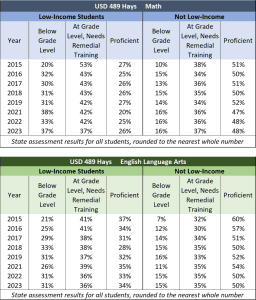KASB congratulates USD 489 Hays on declining student outcomes
(The Sentinel) – If Benjamin Franklin were alive today, he might say there are three things you can count on – death, taxes, and the Kansas Association of School Boards putting a positive spin…

(The Sentinel) – If Benjamin Franklin were alive today, he might say there are three things you can count on – death, taxes, and the Kansas Association of School Boards putting a positive spin on declining student outcomes.

A March 26 column by KASB’s Mark Tallman touts state assessment results at USD 489 Hays as exceeding projections, calling them “some of the highest student success results in the state when considering its enrollment and student demographics. Based on the actual data, that’s like saying a baseball team’s batting average on cloudy days for left-handed hitters is a little better than expected. The characterization is meaningless, which is how KASB and many education officials want it. No specific outcome data, just hard-spun generalizations.
State assessment results show that 37% of low-income students in USD 489 are below grade level in math, and only 26% are proficient; that is worse than in pre-pandemic 2019 results, which were below 2015 levels. The same is true for students who are not low-income.
In English Language Arts, 31% of low-income students are below grade level, and 34% are proficient. That is worse than in 2015 and about the same as in 2019.
Outcomes for students who are not low-income are worse than in 2015 and 2019.
KASB says USD 489 Hays is among “some of the most successful and improving schools.” Some students are undoubtedly doing well, as in every district, but many are not.
The table above measures outcomes for all students tested in Grades 3-8 and 10, but results are considerably lower for just the 10th Grade.
- 53% of low-income students are below grade level in math, and only 11% are proficient.
- 27% of students who aren’t low-income are below grade level in math, with just 39% proficient.
- 36% of low-income students cannot read at grade level, and only 22% are proficient.
- 23% of students who aren’t low-income cannot read at grade level, with just 39% proficient.
The staff at USD 489 is undoubtedly working hard to implement the strategies developed by district management, but far too many students are being left behind, and that won’t change if district administrators pretend all is well and keep doing what is delivering the current outcomes.
The Kansas Association of School Boards spinning serious issues into rainbows only makes matters worse for students who are being left behind.



